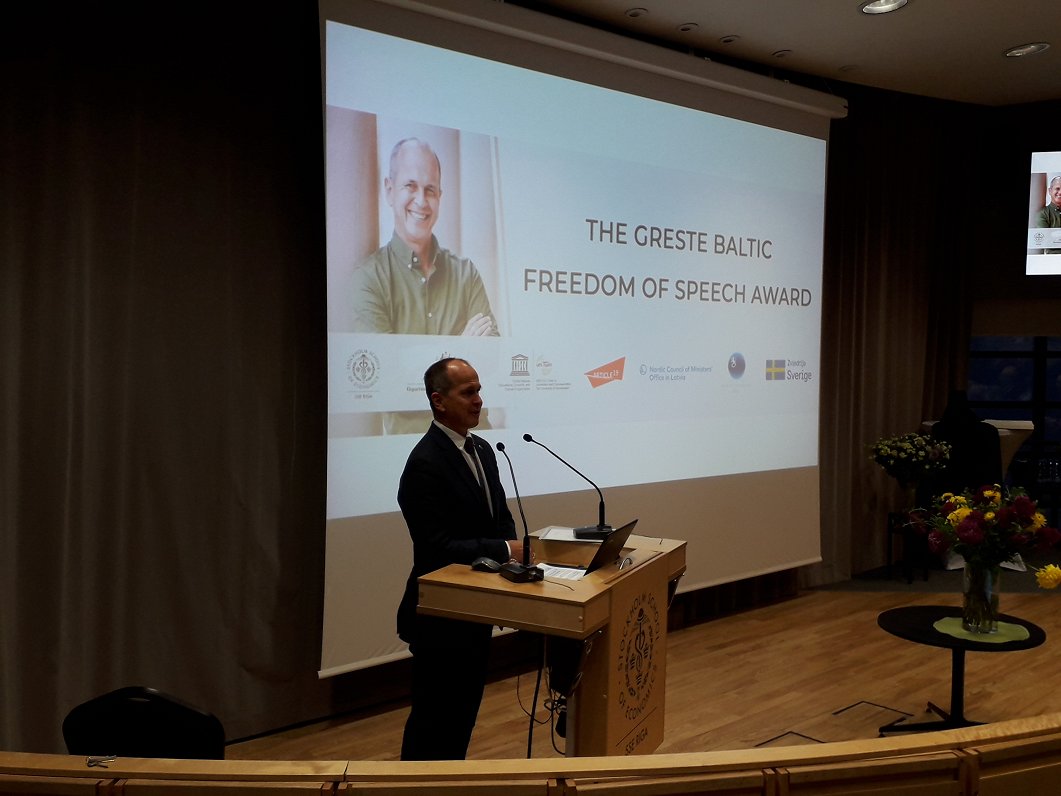The awards were presented in the presence of Peter Greste, the Latvian-Australian international correspondent whose case became a cause celebre when he was jailed in Egypt on trumped-up charges of supporting a terrorist organization, famously receiving his Latvian passport while in custody.
“We cannot have strong democracies without strong journalism. We cannot live in free societies without a free press and freedom of speech,” said Greste before the presentation.
“By world standards, the Baltic States are certainly not terrible, but we cannot take that state of affairs for granted. After going through the Second World War, the Soviet era, and finally independence, nobody in Estonia, Latvia or Lithuania assumes these freedoms are a given,“ he said.
The Greste Award recognizes pioneering work that expands and protects freedom of expression. Nominees were considered by representatives of journalist and human rights organisations from the Baltic States, alongside international freedom of expression organisation ARTICLE 19. The prize is awarded to one winner from each of the three Baltic states.
The Greste Award winner from Latvia was investigative journalism organization Re:Baltica. Founded in August 2011, Re:Baltica has become one of the strongest sources of investigative journalism in the Baltics and their stories have been used extensively by LSM as well as many other international news outlets.
Other nominees from Latvia included the work of Vita Antstrate, a journalist from Latvian Radio for her reporting and development of the pubic media program "Children of the system", in which she explored the conditions for children in large institutions such as orphanages. Antstrate's reporting prompted a major scandal, prompted immediate and widespread public debate and ultimately caused action to be taken by institutions and the legislature.
Special praise was also given to the journalists Olga Petrova and Diana Chuchkova of rus.delfi.lv for their project “Kletka”/Cage, which tells a story of the only women’s prison in Latvia where mothers live with their children. The project has helped to fight the stigmatization of women who have been in prison.
The winner of the Estonian prize is journalist Kadri Ibrus, of the Eesti Päevaleht newspaper for her consistent efforts in producing powerful material on difficult and unpopular issues on the Estonian healthcare system.
The award for Lithuania went to the Lithuanian journalist community as a whole, which was honored for its collective effort in fighting information access restrictions imposed by the Lithuanian government, and their efforts have contributed to renewed emphasis on transparency by the State.
As part of the presentations, the Australian Embassy in Sweden awarded the winner of their Special prize for the Human rights organizations that promote freedom of Speech in the Baltic States to the Human Rights Monitoring Institute (hrmi.lt), a public advocacy organization. Since its establishment in 2003, HRMI has been an active champion for freedom of expression and information in Lithuania and the Baltics, significantly contributing to the protection of freedom of speech in the Baltic region.
Towards the end of his speech Peter Greste paid tribute to all the nominees, saying:
“The winners of tonight’s awards are individuals and organizations who the jury has recognized as not only being exponents of strong journalism and defenders of freedom of speech. They are people who, through their work, have helped reverse that tide, giving the public reason to trust and to have confidence in those most fundamental ideas"
"When journalists are doing their jobs, they become pebbles in the shoes of our political leaders. They are irritants and provocateurs, holding the powerful to account, and so they often attract the anger of the powerful. It means pressure and intimidation. Standing up to that, continuing to work in the face of such pressure takes courage and commitment.”





























